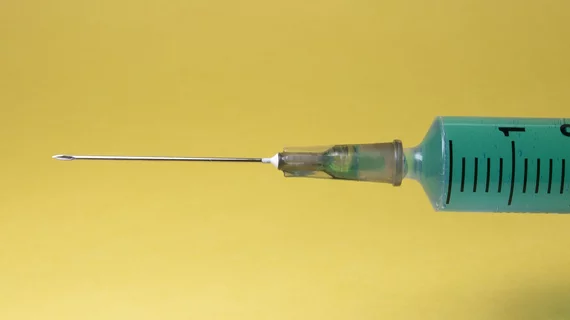COVID-19 vaccines are associated with a slightly higher risk of myocarditis, according to two new studies published in the New England Journal of Medicine. These cases of myocarditis are typically mild and primarily occur in young men.
It is important to remember, one specialist argued, that this risk is still so low that people should not see it as a reason to avoid being vaccinated.
The first analysis focused on data from the Israeli Ministry of Health on suspected myocarditis among vaccinated individuals from December 2020 to May 2021. All study participants received the Pfizer-BioNTech COVID-19 vaccine.
Using the Brighton Collaboration definition of myocarditis, researchers identified 136 “definitive or probable” cases among more than 5 million people. This translated to a rate ratio of 2.35, though the risk was significantly higher among young men between the ages of 16 and 19 years old. Patient symptoms were “usually mild.”
“On the basis of data from an Israeli national database, the incidence of myocarditis after two doses of the BNT162b2 mRNA vaccine was low, but higher than the incidence among unvaccinated persons and among historical controls,” wrote lead author Dror Mevorach, MD, from the department of internal medicine at Hadassah Medical Center in Israel, and colleagues.
The second study, meanwhile, was performed by lead author Guy Witberg, MD, a cardiologist at Rabin Medical Center in Israel, and colleagues.
The work of Witberg et al. focused on cases of suspected myocarditis among vaccinated patients in Israel from December 2020 to May 2021. Again, all study participants received the Pfizer-BioNTech COVID-19 vaccine.
Researchers used the CDC definition of myocarditis and performed a Kaplan-Meier analysis of reported cases of myocarditis up to 42 days after a first vaccine dose. The estimated incidence of vaccine-related myocarditis was 2.13 cases per 100,000 persons who received at least one vaccine dose.
The rate was found to be higher—10.69 cases per 100,000 persons—among male patients between the ages of 16 and 29 years old. While 76% of myocarditis cases were mild, 22% were intermediate and a single case was associated with cardiogenic shock.
Reviewing the findings
Alida L.P. Caforio, MD, PhD, a cardiologist from the University of Padua in Italy, reviewed the findings of both studies in a separate editorial.
“Most of the reported cases that occurred after vaccination had an uneventful course,” Caforio wrote. “The take-home messages from the two studies may be that clinically suspected myocarditis is temporally associated with the BNT162b2 mRNA vaccine but is rare, is more common in young male patients, and (with a few exceptions) is self-limiting.”
Caforio also emphasized that the risk of vaccine-related myocarditis remains “very low” and said these studies could make a big impact moving forward.
“The results of these two studies are valuable for doctors, patients, and the public to reduce the fear of myocarditis as a reason for excluding young people from vaccination, especially since myocarditis has also been temporally associated with COVID-19,” Caforio wrote. “Meanwhile, active surveillance for myocarditis should continue, and endomyocardial biopsy could be performed in severe cases to affirm the diagnosis and possibly to guide therapy, such as the use of antiviral drugs or immunosuppressive and immunomodulatory agents.”
Caforio’s full editorial is available here.

